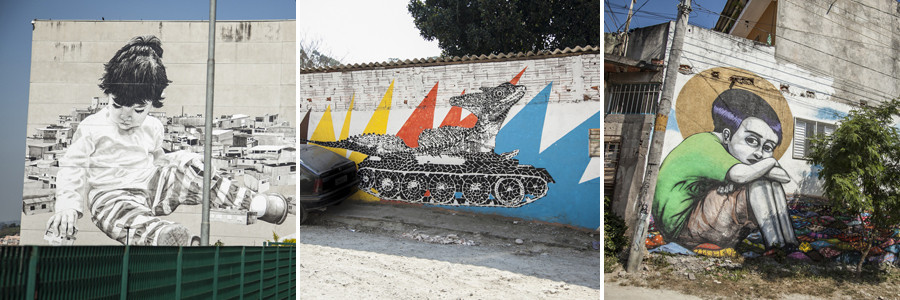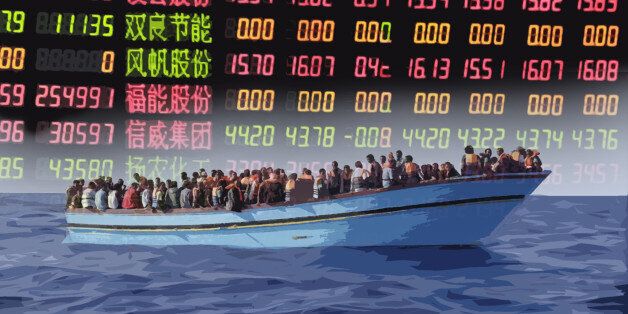Nathan Gardels is the editor-in-chief of Noema Magazine.
The undertow of China’s slackening economy and the mounting tide of refugees pushing through border after border in Europe put the world on edge this week. After spiraling down, volatile stock markets rallied back, for now. . .
Writing from Beijing, Fred Hu argues that what we are witnessing is China’s shift toward the “new normal” of a slower growth paradigm focused on domestic consumption instead of investment and export-led growth. He expresses confidence that his country will weather the storm, writing, “it is a loser’s game to bet against China’s leaders.” Nobel laureate Michael Spence locates the culprit of market volatility in the flood of funds unleashed by low interest rates looking for higher returns, which has led to the gap between a financial bubble and the real economy now undergoing a correction.
Economist Brad DeLong argues that China’s “supergrowth”only has five more years to run before it becomes just “another corrupt middle-income country.” Meanwhile, we look at the “Eyes on China” Instagram project that reveals real life behind China’s virtual firewall. WorldPost China Correspondent Matt Sheehan asks whether China’s “one-child policy enforcers” can boost the cognitive skills of children in rural Danfeng County. Summarizing his research after a stint at Beijing’s Renmin University, Israeli scholar Alon Tal concludes that China’s unpopular one-child policy has helped avoid famine and even worse ecological damage in a country with a population approaching 1.5 billion people.
Often guided by maps on their smartphones, a swell of refugees fleeing war and seeking asylum has overwhelmed European authorities. António Guterres, United Nations high commissioner for refugees, puts the crisis in a global context of world disorder where no one is in control. “When power relations are unclear, impunity and unpredictability tend to prosper,” he says. “That, I believe, is the reality behind the high levels of displacement that are taking place in today’s world.” Writing from Berlin, Germany’s Foreign Minister Frank-Walter Steinmeier and Economics and Energy Minister Sigmar Gabriel present a 10-point plan to solve the refugee crisis. From Vienna, WorldPost Middle East Correspondent Sophia Jones tells the horrid tale of over 70 refugees found dead in a truck at the Austrian-Hungarian border. Danae Leivada reports on a gigantic car ferry chartered by the Greek government to take thousands of Syrian refugees from the small islands they have reached to Athens, where they are being settled into a new camp.
World Reporter Charlotte Alfred describes how a library in the “Jungle” camp in Calais, France is bringing poetry to refugees settled there. And HuffPost Germany’s Christoph Asche relays what one priest in that country is doing to address the refugee crisis.
As the U.S. Congress’ vote on the Iran nuclear deal nears, dissident journalist Akbar Ganji and UN envoy Richard Falk appeal for its passage. We also post several video messages to Americans from other Iranian voices, including Nobel laureate Shirin Ebadi, supporting the deal. Iran’s former Foreign Minister Ebrahim Yazdi writes an unusual open letter to Congress, which argues that the “economic deprivation” caused by sanctions and “the pall of war” have never advanced democracy and human rights in his country. Muhammad Sahimi argues that Iran’s agreement to stall its nuclear program is a defeat for Ayatollah Khamenei. On the one year anniversary of the Gaza war cease-fire, Harvard’s Daniel Sobelman writes that Israel and Hamas seem to be inching toward ending the siege of the Gaza strip. In an excerpt from his new book, Palestinian journalist Mohammed Omer remembers the events of that day and one boy who lost members of his family just as the truce was announced. Reflecting on the death in recent days of Pakistan’s former spy chief Hamid Gul, Mohammad Taqi says Gul was a “pan-Islamist fundamentalist” who was the “military equivalent of Osama bin Laden.” We also take a look at the trailer of the forthcoming biopic, “He Named Me Malala,” about the young girl and human rights activist who survived an attack on girl’s education in Pakistan and publish an excerpt of Shanoor Seervai’s e-single book, “Daughters of the Red Light,” about women in Mumbai escaping from India’s notorious sex industry.
Qasim Rashid says that the Islamic State’s persecution of Christians is in stark contrast with the way Christians are supposed to be treated in Islam. In a photo essay, we look at historic photos of the ancient city of Palmyra now being destroyed by ISIS. Alaa Abdel Fattah, the software engineer turned protest leader during the Arab Spring, says in a HuffPost Arabi interview from Cairo that “the revolutionary youth are too weak for the regime to care about reconciling with them.” Raghida Dergham worries that “the security situation in Turkey has started to resemble what is happening in Arab nations, whose capitals and ancient cities are frequently rocked by bombs but also confused politics.” Amnesty International’s Campaigns Director for South East Asia Josef Benedict worries that this weekend’s massive demonstrations against corruption could end in violence.
In “Forgotten Fact” this week we look at “the other drought” — not in the western U.S., but in southern Africa.
Writing from São Paulo where she met 100 other McDonald’s workers from around the world, Bettie Anne Douglas chronicles her 7-year battle to raise the minimum wage. Maha Hosain Aziz looks at how crowdsourcing Brazi’s anti-corruption effort might ease Brazil’s legitimacy crisis. BrasilPost shares this photo essay of the “coolest graffiti” in the Grajaú district of São Paulo.
In other photo essays, we look at a child wedding in Bangladesh, the 20th century dystopia of North Korea, the pile up of trash in Lebanon and the best landscape photographs of the year.
Alexis Sobel Fitts examines how Google is changing the way we think. Our Singularity series this week speculates that microwaves instead of traditional fuels could power future space planes. Finally, in Fusion, we assess recent reports that China, which mostly burns soft coal, is spewing out less carbon emissions than previously thought.
 Alexandre Orion/Matias Picón/Tinho
Alexandre Orion/Matias Picón/Tinho
WHO WE ARE
EDITORS: Nathan Gardels, Senior Advisor to the Berggruen Institute on Governance and the long-time editor of NPQ and the Global Viewpoint Network of the Los Angeles Times Syndicate/Tribune Media, is the Editor-in-Chief of The WorldPost. Farah Mohamed is the Managing Editor of The WorldPost. Kathleen Miles is the Senior Editor of the WorldPost. Alex Gardels and Peter Mellgard are the Associate Editors of The WorldPost. Katie Nelson is the National Editor at the Huffington Post, overseeing The WorldPost and HuffPost’s editorial coverage. Eline Gordts is HuffPost’s Senior World Editor. Charlotte Alfred and Nick Robins-Early are World Reporters. Rowaida Abdelaziz is Social Media Editor.
CORRESPONDENTS: Sophia Jones in Istanbul; Matt Sheehan in Beijing.
EDITORIAL BOARD: Nicolas Berggruen, Nathan Gardels, Arianna Huffington, Eric Schmidt (Google Inc.), Pierre Omidyar (First Look Media) Juan Luis Cebrian (El Pais/PRISA), Walter Isaacson (Aspen Institute/TIME-CNN), John Elkann (Corriere della Sera, La Stampa), Wadah Khanfar (Al Jazeera), Dileep Padgaonkar (Times of India) and Yoichi Funabashi (Asahi Shimbun).
CONTRIBUTING EDITORS: Moises Naim (former editor of Foreign Policy), Nayan Chanda (Yale/Global; Far Eastern Economic Review) and Katherine Keating (One-On-One). Sergio Munoz Bata and Parag Khanna are Contributing Editors-At-Large.
The Asia Society and its ChinaFile, edited by Orville Schell, is our primary partner on Asia coverage. Eric X. Li and the Chunqiu Institute/Fudan University in Shanghai and Guancha.cn also provide first person voices from China. We also draw on the content of China Digital Times. Seung-yoon Lee is The WorldPost link in South Korea.
Jared Cohen of Google Ideas provides regular commentary from young thinkers, leaders and activists around the globe. Bruce Mau provides regular columns from MassiveChangeNetwork.com on the “whole mind” way of thinking. Patrick Soon-Shiong is Contributing Editor for Health and Medicine.
ADVISORY COUNCIL: Members of the Berggruen Institute’s 21st Century Council and Council for the Future of Europe serve as the Advisory Council — as well as regular contributors — to the site. These include, Jacques Attali, Shaukat Aziz, Gordon Brown, Fernando Henrique Cardoso, Juan Luis Cebrian, Jack Dorsey, Mohamed El-Erian, Francis Fukuyama, Felipe Gonzalez, John Gray, Reid Hoffman, Fred Hu, Mo Ibrahim, Alexei Kudrin, Pascal Lamy, Kishore Mahbubani, Alain Minc, Dambisa Moyo, Laura Tyson, Elon Musk, Pierre Omidyar, Raghuram Rajan, Nouriel Roubini, Nicolas Sarkozy, Eric Schmidt, Gerhard Schroeder, Peter Schwartz, Amartya Sen, Jeff Skoll, Michael Spence, Joe Stiglitz, Larry Summers, Wu Jianmin, George Yeo, Fareed Zakaria, Ernesto Zedillo, Ahmed Zewail, and Zheng Bijian.
From the Europe group, these include: Marek Belka, Tony Blair, Jacques Delors, Niall Ferguson, Anthony Giddens, Otmar Issing, Mario Monti, Robert Mundell, Peter Sutherland and Guy Verhofstadt.
MISSION STATEMENT
The WorldPost is a global media bridge that seeks to connect the world and connect the dots. Gathering together top editors and first person contributors from all corners of the planet, we aspire to be the one publication where the whole world meets.
We not only deliver breaking news from the best sources with original reportage on the ground and user-generated content; we bring the best minds and most authoritative as well as fresh and new voices together to make sense of events from a global perspective looking around, not a national perspective looking out.





